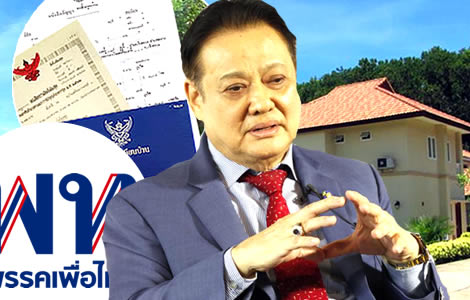The government has been left reeling as opposition to its property for wealthy foreigners regulation rises with fears of abuses by wealthy Chinese investors as is the case in Laos and Cambodia. Employer group boss Tanit Sorat leads the charge and was supported, on Saturday, by the Pheu Thai Party which accused the government of undermining Thai core interests and future generations through the use of regulatory measures.
A key Thai industry leader, this week, warned that a plan to allow wealthy foreigners to own land plots of up to 1 rai for residential purposes in Thailand was open to abuse and would lead to ordinary Thais being priced out of the market by speculators from China. His reproach to the government’s plan was followed up on Saturday by the Pheu Thai Party which forewarned that a vital national interest was at stake and exhorted the government instead to work towards ensuring poorer Thai people can buy their own homes and land while also criticising it’s use of ministerial regulations to enact controversial and far-reaching changes which undermined the national interest.

Pheu Thai, the main opposition party, on Saturday, issued a statement opposing a decision by the cabinet, on Tuesday, to allow in principle, elite foreigners who hold new 10 year long term visas to purchase land for a home in the kingdom.
The scheme, which was launched on the 1st of September, is aimed at four groups of wealthy investors and global citizens, wealthy retirees as well as those with skills and intellectual property assets to come and live in Thailand while offering a flexible work visa.
Cabinet approved the new regulation drawn up by the Ministry of the Interior on Tuesday which is a more liberalised version of an existing 2002 measure
The regulatory measure before the cabinet meeting on Tuesday came from the Ministry of the Interior after a proposal put forward by the economic development team within the government got the green light in an earlier cabinet decision in February.
The detailed regulation will only allow foreigners to own residential land in plots of 1 rai or 0.16 hectares, the equivalent of 0.4 acres in Bangkok, Pattaya and other municipalities.
Cabinet approves land rights for rich foreigners as Thailand ramps up inward investment in 2022
The new regulation is similar to a 2002 measure agreed upon by the government at that time in consultation with the International Monetary Fund.
Pheu Thai slams the government’s vision of a sunny land for global citizens as detrimental to locals
On Saturday, the Pheu Thai Party statement differed from the government’s contention, put forward by the economic unit under Deputy Prime Minister Supattanapong Punmeechaow, that the scheme would attract investment into the kingdom and help generate more economic growth to the extent of 5%, over the next 5 years.
The new visa plan, unveiled last year and approved by the cabinet in February, sees Thailand as a sun-soaked oasis for wealthy global professionals who want an efficient and cost-effective local base.
Wealthy foreigners to own small landholdings associated with homes here agreed in principle
10-year visas for the right kind of foreigner who can play a part in Thailand’s economic future
Economic plan to put the smile back in Thailand’s appeal to western foreigners to live and work
On Saturday, the Pheu Thai statement took issue with these claims saying the initiative would not ultimately prove beneficial to Thailand’s grassroots economy and ordinary people.
The statement claimed that the initiative would adversely impact those in Thailand who don’t yet own land, property or a home because it would lead to higher prices.
The government’s scheme hopes to attract 1 million extremely wealthy global citizens to Thailand over the next 5 years generating up to ฿1 trillion in extra annual GDP after 5 years and ฿800 billion in investment over the same period.
Thai Chamber of Commerce Chairman Sanan Angubolkul welcomed the moves as older twenty-year scheme for foreign land ownership is compared
This week, welcoming the proposal, Sanan Angubolkul, the Thai Chamber of Commerce Chairman, noted that Thailand had implemented such a scheme before in response to the 1997 Financial Crisis.
However, sources have pointed out that this was only agreed by the Thaksin government under the Thai Rak Thai Party, the predecessor to Pheu Thai as a concession to the International Monetary Fund when negotiating debt repayment terms linked with the crisis and has rarely been used.
The scheme still in operation allows a foreigner to apply to the Ministry of the Interior for permission to own land where ฿40 million has been invested in the kingdom and also, similar to the new initiative, limited to 1 rai for residential property.
The investment conditions are similar to the new scheme but specify that the investment must be held for 5 years in contrast to a reduced period of 3 years under the new scheme.
Old 2002 scheme was limited to property purchases and also allows foreigners to purchase industrial units
The current proposal allows for the disposal of the property by the Director-general of the Land Office if the it is not used by the foreigner within two years of the registration of the title.
Foreigners can also apply to own industrial units under certain conditions such as Section 44 of the Industrial Estate Authority of Thailand (IEAT) Act but are required to dispose of such holdings within 3 years of a business ceasing to operate.
The Pheu Thai Party, on Saturday, categorised this latest more wide-ranging government scheme as a desperate effort by ministers to attract investment and boost economic activity by offering benefits in response to its own lacklustre management of the economy.
It also queried a decision to reduce the minimum investment period for eligible and participating foreigners from five to three years.
Strict conditions imposed by the Interior Ministry mean both visa and land ownership rights can be revoked if the investment conditions are not met
It emerged last Tuesday, after the announcement, that the Ministry of the Interior has imposed strict conditions on both the 10-year long term visa and investments made under it.
A rule specifies that all benefits including the visa can be revoked if investment commitments are not kept for the minimum period.
One industry leader called for Thai citizenship instead to be handed out to investors and key personnel in the Eastern Economic Corridor (EEC) project
On Wednesday, Mr Tanit Sorat, the Vice Chairman of the Employers Confederation of Thai Trade and Industry expressed disapproval of the new plan fearing abuses seen in other countries.
Employers leader in Thailand comes out strongly against the new scheme being pushed by the government fearing abuse by Chinese speculators
He called for the government to alternatively offer Thai nationality to investors interested in helping the country’s flagship Eastern Economic Corridor (EEC) in Chachoengsao, Rayong and Chonburi.
The regulation, approved by the cabinet on Tuesday, requires an investment of ฿40 million under the Long Term Visa scheme in Thailand whether through cash funds, local securities, property or in companies which have obtained Board of Investment (BOI) approval.
The new dispensation will go live after it is formally processed and published in the Royal Gazette.
Mr Tanit has warned that the new scheme may be open to abuse, particularly by Chinese investors and points to unhealthy developments in both Laos and Cambodia where wealthy Chinese have become the dominant economic force in some areas through the acquisition of property assets and business investments.
‘Thailand may be headed for trouble involving land speculation, meaning locals may be unable to afford to purchase land because of higher prices,’ Mr Tanit Sorat, warned. ‘We are worried about Chinese investors. They already bought and own plots of land in Cambodia and Laos.’
Pheu Thai Party called on the government to put the core interests of Thais and future generations first with regard to this policy, help poor Thais instead
On Saturday, Pheu Thai called for the government to prioritise instead helping poorer Thai people find their own homes including future generations.
It cautioned that the reduced three-year investment period will see short-term investments by foreigners who will then become property speculators in the Thai market in key urban centres across the kingdom competing predominantly with lower-earning Thai workers and raising property prices.
It bluntly stated that these investors in many cases will have no obligation or commitment to Thailand despite the new scheme’s bright and lofty intentions.
The party emphasised the core value of preserving Thai land and resources for future generations of Thais.
It lamented the current government’s direction with significant measures being introduced through ministerial regulation and cabinet resolutions while undermining vital national interests.
Government spokesman outlines abuse safeguards
This week, government spokesman Anucha Burapachaisri defended the proposal, pointing out that the concession was a once-off for those investors who would not be able to buy a second property even after selling off the first, obtained under the scheme.
He also pointed to clearly defined rules to be monitored and enforced under the proposed new scheme by the Director-general of the Land Department.
He said that there were 8 cases of foreign nationals who have availed of the ministerial regulation issued by the Thai Rak Thai government in 2002.
Join the Thai News forum, follow Thai Examiner on Facebook here
Receive all our stories as they come out on Telegram here
Follow Thai Examiner here
Further reading:
Cabinet approves land rights for rich foreigners as Thailand ramps up inward investment in 2022
Amazon becomes a key investor in Thailand as cloud computer firm AWS sets up shop in Bangkok
10 year visa a magnet for global citizens setting up in Thailand with zero tax on offshore income
Wealthy foreigners to own small landholdings associated with homes here agreed in principle
New plan for the Thai economy could see an elite foreign visa scheme generate up to 6% of GDP
Economic plan to put the smile back in Thailand’s appeal to western foreigners to live and work
Economic fears rising as Thailand faces a bigger crisis than 1997 with rising job losses and debt
Central bank to lower GDP growth forecast as its attention turns to private sector debt management
Loan bill passes but Thai economic prospects are not bright with a 1.8% 2021 GDP gain predicted
IMF urges government to loosen nation’s purse strings as finances tighten with the tax take down
Plan to allow high tech and skilled foreigners to live and work in Thailand for up to four years
Economy to rebound as the year progresses driven by exports and a return of mass foreign tourism
Fact – only 6,556 visitors arrived in Thailand last month compared to 3.95 million in December 2019
Desperate foreign tourism business concerns are clinging to straws as they try to survive the crisis
Finance Minister says economy must pivot away from tourism with a switch to S-Curve industries


















